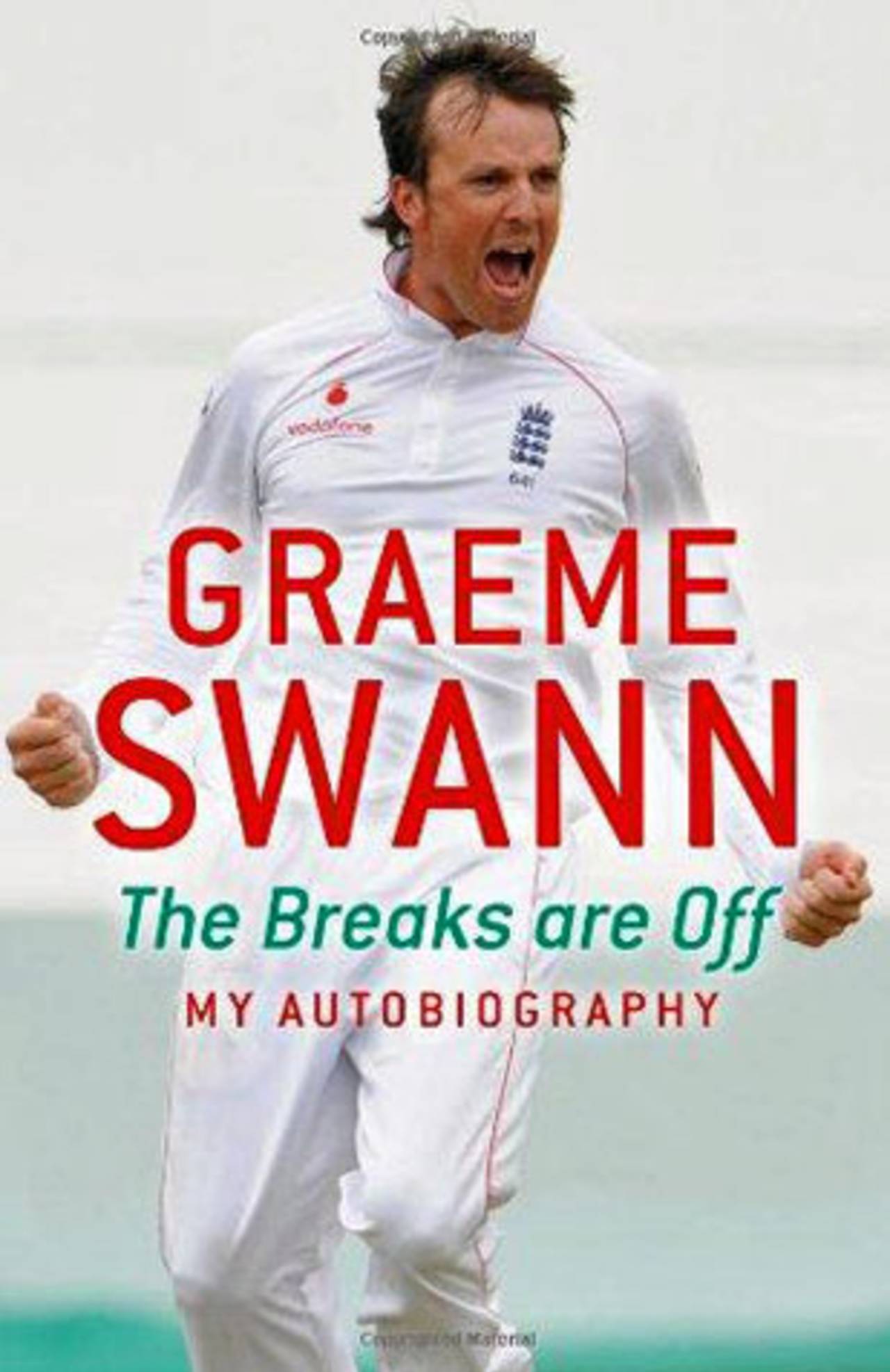A lad's brags and gags
Graeme Swann's autobiography has plenty of jolly japes but not too much else besides
Sahil Dutta
15-Jan-2012

Hodder and Stoughton
Graeme Swann has all he needs to rip a good yarn: he's quick-witted, irreverent, and possesses a career story that continues to astonish. With both him and the England team entering a legacy-defining phase, there may well be more to say when he retires. It's a pity he didn't hold back his autobiography, The Breaks Are Off, until then.
The fact he didn't says plenty about his motivations for writing the book. On more than one occasion Swann berates cricket boards for masking money-making intentions behind grandiose claims - like when England returned to India after the Mumbai atrocity in 2008. Fair point though this is, it is difficult to see Swann's book as anything other than a cash-in itself.
Nonetheless, in an age where players regurgitate off-the-peg quotes to feed 24-hour news, Swann is a relief. He is honest and amusing, styling himself as a proper "lad", who is quick to take the piss, see the funny side and play the rogue. Anyone who has followed England over the last few years will know that already. The book's biggest flaw is that he tells you no more.
Reading it feels like being pinned at the bar while Swann regales you with tale after tale of drunken japes: "Remember that time we got hammered at the Under-19 World Cup and rugby-tackled Allan Border? Remember that time we got obliterated in Lincolnshire and got punched in the face? Remember that time Gough lamped me in South Africa?"
Swann emerges as a likeable, if sometimes annoying, bloke. Being jettisoned by England for seven years clearly hurt him, but at no point does he betray any bitterness. Still, if the cliché about cricket revealing inner character holds true, there must be more to Swann.
By the time he made his Test debut, traditional offspin felt drab, but - in what was meant to be the age of mystery spin - Swann made the orthodox cool again. No longer do you see a young finger-spinner like George Dockrell and wish he was something else. Bowling spin needs personality, and the way Swann plays suggests he has it by the shed-load. Peter Moores, the coach who brought him back into the England fold, has talked about Swann creating a "theatre of pressure" out in the middle, and how it is through Swann's strength of character that he is able to assert himself on the game.
It would be interesting to know where Swann got such confidence, or how he thinks about the game. A glimpse is offered when he recalls spotting a glitch while watching Marcus North compile a century in Cardiff in 2009. "Because he had a big, high backlift I suspected he would be susceptible to the ball that went straight on from around the wicket." Sure enough, in the next Test at Lord's, Swann was "proved right by a delivery that chipped the pad and cleaned him up". It's one of the few insights into the mechanics of his art Swann gives. He says he "always found bowling very instinctive" and doesn't decide what he's going to bowl "until he's at the crease". Maybe he thought delving into the mechanics would be a touch too serious for his public persona, but expanding on his thoughts about the game would have helped his book greatly.
What does emerge is the back-story to Swann's gnarled competitiveness. His father, Ray, was a stern secondary-school teacher, high-quality club player and filthy sledger, who demanded high standards from Graeme and his brother (former first-class cricketer) Alec. Despite their successes, he was disappointed more often than not. Swann's mother, Mavis, was also strong-willed, banning both sons from playing Northamptonshire age-group cricket after Alec was unfairly accused of abusing an umpire. It meant Graeme played adult club cricket between the ages of 12 and 16, which he sees as integral to his development.
Though there is no intense introspection, Swann is clear about the problems he has had with management. From youth cricket through to the recent pre-Ashes "bonding camp", which he described as "degrading", he has never much cared for authority or guidance. Until Andy Flower, the only coaches he respected were the ones who allowed him to act how he pleased.
Given the frenzy whipped up about the book's criticism of Kevin Pietersen, the actual passages in print are quite mild. Pietersen was "not a natural leader" and England "have the right man" in Andrew Strauss. If anything, it's the rest of the book that suggests Swann's simmering dislike for Pietersen - hardly surprising, considering both men have had issues with authority, crave attention and can claim to be the top dog in the team.
Following the popularity of Swann's Ashes video diaries and his widely followed tweeting, an autobiography was probably the obvious progression. After all, it's what celebrities do. While Swann's is probably more entertaining than most, it is not much more enlightening.
The Breaks Are Off: My Autobiography
Graeme Swann
Hodder & Stoughton

Graeme Swann
Hodder & Stoughton